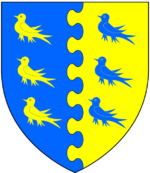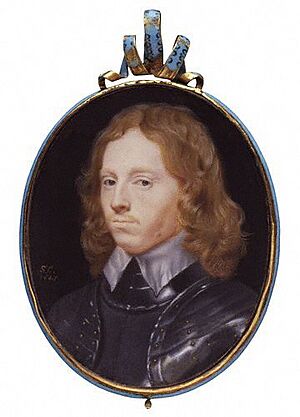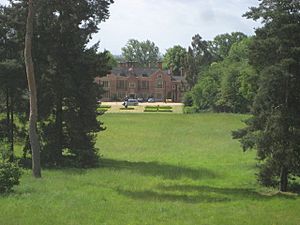George Fleetwood (regicide) facts for kids
Quick facts for kids Fleetwood |
|
|---|---|
 |
|
| Country | |
George Fleetwood (1623–1672) was an important English military leader. He was a major-general during a time of great change in England. He is also known as one of the people who signed the death warrant for King Charles I. This was a very significant event in English history.
Fleetwood was involved in the trial of King Charles I in 1648–1649. He also served in the last Commonwealth Council of State. He was a Member of Parliament (M.P.) for Buckinghamshire in 1653. Later, he was M.P. for Buckingham in 1654. He became a member of Cromwell's Upper House in 1657. In 1660, he joined General George Monck. Although he was sentenced to death when the monarchy was restored, he was never executed.
His second wife, Hester Fleetwood, later created a famous book of recipes.
Contents
George Fleetwood's Life
Early Life and Family
George Fleetwood was born in 1623. His grandfather was Sir George Fleetwood. George inherited a family estate called The Vache. This estate was located near Chalfont St Giles in Buckinghamshire.
His father, Charles Fleetwood, passed away in 1628. George then became the owner of the family estate.
Supporting Parliament
During the English Civil War, George Fleetwood supported the Parliament. In 1643, he raised a group of soldiers called dragoons. These soldiers helped defend parts of Buckinghamshire for Parliament.
In 1644, Fleetwood was listed as a member of the Buckinghamshire committee. This committee helped manage the county's affairs for Parliament.
Role in King Charles I's Trial
In July 1647, Fleetwood became a Member of Parliament for Buckinghamshire. In 1648, he was chosen as one of the commissioners for the king's trial. He attended two court sessions and was present when the king was sentenced. He also signed the death warrant for King Charles I.
In 1649 and 1650, Fleetwood was a colonel in the Buckinghamshire militia. He was also chosen to be a member of the Council of State. This council helped govern England during the Commonwealth period.
Family Life
George Fleetwood was a widower with two children. He married Hester Smyth in 1651 or 1652. They had five children together. Sadly, at least two of their children died young. They were left with two daughters and a son named Robert.
Political Career Under Cromwell
In 1653, Fleetwood represented Buckinghamshire in the assembly known as the Barebones Parliament. He then represented the town of Buckingham in the parliament of 1654.
In 1656, Oliver Cromwell knighted him. This was a special honor. In December 1657, Cromwell also asked him to join Cromwell's Upper House. This was like a second chamber of Parliament.
The Restoration and Later Life
When Sir George Booth started a rebellion, Parliament allowed Fleetwood to raise a group of volunteers. Fleetwood refused to help General John Lambert against General George Monck. He also opposed a specific oath in Parliament.
In the spring of 1660, Monck gave Fleetwood command of a regiment. On May 11, 1660, Fleetwood announced that Charles II would be king at York. This was a key moment in the return of the monarchy.
When those who had signed the king's death warrant were asked to surrender, Fleetwood gave himself up. This happened on June 16, 1660. He was not included in the Act of Indemnity. This act offered pardons to many people.
At his trial in October 1660, Fleetwood admitted his guilt. He was sentenced to death. However, a special rule in the Act of Indemnity meant his execution was put on hold. This was unless Parliament passed another act specifically for his execution.
Fleetwood asked Parliament for mercy. He said his name was added to the list of commissioners without his knowledge. He also claimed Cromwell forced him to sign the warrant. He was young at the time and scared by Cromwell's power.
He showed proof from Monck and Ashley that he had helped bring back the monarchy. He spoke about his regret and asked for the king's mercy. His life was spared, but his estate, The Vache, was taken away. It was given to the Duke of York.
What happened to Fleetwood after 1664 is not fully clear. A warrant was issued in 1664 to send him to Tangiers. However, his wife may have stopped this. Some sources say he was released and went to America. But a notice in the London Gazette from 1672 states he died in Tangiers on November 17, 1672.
 | Dorothy Vaughan |
 | Charles Henry Turner |
 | Hildrus Poindexter |
 | Henry Cecil McBay |



